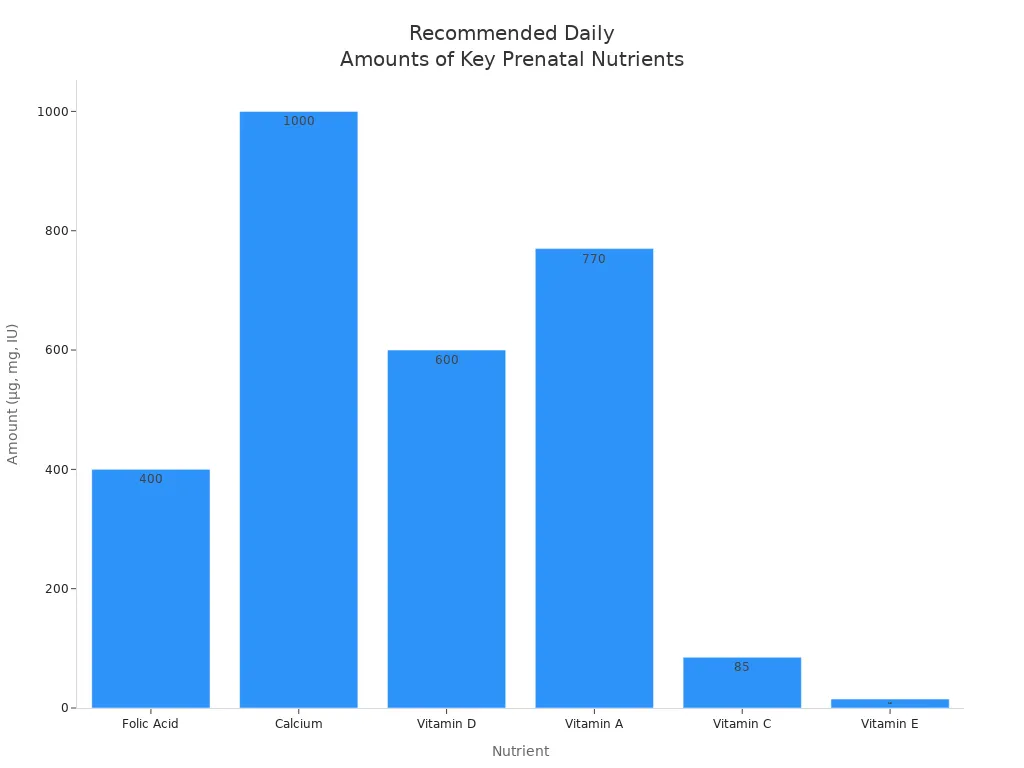Prenatal Vitamin Absorption Myths Busted for Good
Table of Contents

You might expect your prenatal vitamins to work the same for everyone, but prenatal vitamin absorption depends on many factors. Your health, the supplement form, and what you eat all play a role. For example, some forms of iron absorb better than others, and conditions like diabetes or celiac disease affect how your body uses nutrients.
| Factor | Impact on Absorption Rate |
|---|---|
| Maternal Health Status | Conditions like diabetes or celiac disease may require different types or dosages of supplements for optimal absorption. |
| Iron Supplement Absorption | Iron may not be absorbed well due to low stomach acid, high calcium intake, or gastrointestinal disorders, leading to potential deficiencies. |
| Supplement Form | Different forms of iron (e.g., ferrous bisglycinate) may enhance absorption compared to others. |
A balanced diet and regular check-ins with your healthcare provider help you get the most out of your prenatal routine.
Myth #1: Prenatal Vitamin Absorption Is Always the Same
Forms of Prenatal Supplements
You might think all prenatal supplements work the same way, but the form you choose can make a big difference. Prenatal vitamins come as tablets, capsules, and liquids. Each type affects how your body absorbs nutrients.
- Capsules usually dissolve quickly. This helps your body absorb nutrients better and keeps them stable. You can even open some capsules if you have trouble swallowing.
- Tablets may not always dissolve fully. They need binding agents to hold them together, which can make them harder to break down. Some people find tablets hard to swallow and may need to take more than one dose.
- Liquids provide the fastest absorption. They are gentle on sensitive stomachs and allow you to adjust the dose. Liquids work well for people who cannot swallow pills.
Liquid prenatal supplements often deliver nutrients faster than tablets or capsules. This can help you get the benefits of prenatal supplements more quickly, which is important for both maternal health and fetal development.
Tip: If you have trouble swallowing pills or need quick results, ask your healthcare provider about liquid prenatal vitamins.
Individual Differences
Your body absorbs prenatal supplements differently based on your digestive health. During pregnancy, your body can absorb more calcium, iron, and zinc. However, if you have digestive issues, your body may not take in all the nutrients from prenatal vitamins. This can affect the efficacy and safety of your prenatal routine.
Some people need different types or doses of prenatal supplements to get the right amount of nutrients. Your healthcare provider can help you choose the best option for your needs. Good prenatal vitamin absorption supports fetal growth and keeps you healthy.
Remember, the efficacy and safety of prenatal supplements depend on your unique needs. Always talk to your doctor to make sure you get the most benefits of prenatal supplements for you and your baby.
Myth #2: Timing and Food Don’t Matter for Prenatal Vitamins
Best Time to Take Prenatal Vitamins
You may think you can take prenatal supplements at any time, but timing matters for both efficacy and safety. Your body absorbs prenatal vitamins best when your stomach is empty. Research shows that food can lower the absorption of prenatal supplements, which means you may not get the full benefits of prenatal supplements. For the best results, take your prenatal vitamins at least one hour before or two hours after meals. This routine helps your body use the nutrients for maternal health and fetal development.
Some people feel queasy when taking prenatal supplements on an empty stomach. If this happens to you, try taking your prenatal vitamins with a small snack, like a piece of fruit or a cracker. Always listen to your body and talk to your healthcare provider if you have concerns about safety or efficacy.
Tip: Set a daily reminder to take your prenatal supplements at the same time each day. This habit supports improved fetal growth and reduced risk of birth defects.
Food Interactions
What you eat with your prenatal supplements can change how well your body absorbs them. Some foods help, while others make it harder for your body to use the nutrients. For example:
- Eating foods rich in vitamin C, like oranges or strawberries, with plant-based iron sources boosts the efficacy of iron in prenatal supplements.
- Dairy products and calcium-rich foods can block the absorption of iron in prenatal vitamins, lowering their efficacy.
- High-fiber foods may also reduce the absorption of some nutrients in prenatal supplements.
You want to maximize the efficacy and safety of your prenatal supplements for both you and your fetal health. Try to avoid taking prenatal vitamins with foods that block absorption. Instead, pair them with foods that help your body use the nutrients. This approach ensures you get the most out of your prenatal routine and supports fetal growth.
Note: Always check with your healthcare provider before making changes to your prenatal supplements schedule. They can help you find the best plan for your needs.
Myth #3: More Prenatal Supplements Are Always Better
Risks of High Doses
You may believe that taking extra prenatal supplements will boost your health and your baby’s growth. In reality, more is not always better. Your body can only absorb a certain amount of nutrients from prenatal vitamins. When you take too much, your body cannot use the excess, and it may even cause harm. High doses of some prenatal supplements, such as vitamin A, can lead to serious problems. If you take more than 10,000 IU of vitamin A each day, you increase the risk of birth defects and malformations. Doses above 25,000 IU per day can affect your baby’s urinary tract. Extra retinoic acid in your blood during early pregnancy links to miscarriage and problems with your baby’s heart and brain.
Note: Too many prenatal supplements can harm both maternal health and fetal development. Always check with your healthcare provider before changing your dose.
The risks of overdosing on prenatal supplements go beyond vitamin A. Too much folic acid or iron can also cause issues. Studies show that high doses of folic acid during pregnancy may lead to anxiety and depression-like behaviors in children. Excessive intake can lower psychomotor scores and affect memory. Many pregnant women take more than the recommended amount, which can lead to adverse outcomes.
| Supplement Use | Findings |
|---|---|
| Folic Acid Impact | High doses linked to anxiety and depression-like behaviors in offspring mice. |
| Developmental Risks | Excessive intake associated with lower psychomotor scores in children. |
| Neurocognitive Effects | High supplementation negatively affects verbal memory and cognitive function. |
| Intake Statistics | 87% of pregnant women exceeded the tolerable upper intake level for folic acid. |
| Health Risks | High doses linked to adverse fetal outcomes and neurodevelopmental issues. |
Recommended Dosages
You want the benefits of prenatal supplements, but you must follow the right dosage. Healthcare providers recommend specific amounts of prenatal vitamins for safety and efficacy. Less than half of pregnant women take supplements based on professional advice. You should always ask your doctor about the best dose for you. This helps you avoid problems and supports improved fetal growth and reduced risk of birth defects.
- Take prenatal supplements only as directed.
- Do not double up on prenatal vitamins if you miss a dose.
- Ask your healthcare provider to monitor your nutrient levels.
Prenatal vitamin absorption works best when you follow expert guidance. This ensures you get the benefits of prenatal supplements without risking your health or your baby’s safety. Proper use of prenatal supplements supports maternal health, fetal development, and the efficacy of your prenatal routine.
Factors Affecting Prenatal Vitamin Absorption

Many things can change how your body absorbs prenatal supplements. You want to get the most out of your prenatal vitamins for both your health and your baby’s growth. Let’s look at the main factors that affect absorption and how you can improve the efficacy and safety of your prenatal routine.
Digestive Health
Your digestive system plays a big role in how well you absorb prenatal supplements. If you have a healthy gut, your body can take in more nutrients from prenatal vitamins. Some health conditions, like celiac disease or diabetes, can make it harder for your body to absorb what you need. When your digestive system does not work well, you may not get enough iron, folic acid, or other important nutrients. This can affect both maternal health and fetal development.
Some groups face higher risks. Adolescents, women with more than one baby, and those with substance abuse issues may have trouble absorbing prenatal supplements. If you have a medical condition or belong to an at-risk group, talk to your healthcare provider. They can help you find the best way to meet your nutritional needs and keep you and your baby safe.
Tip: If you have stomach problems or a health condition, ask your doctor about special prenatal supplements that are easier to absorb.
| Factor | Description |
|---|---|
| Dietary Habits | Nutritional intake can influence the effectiveness of vitamin absorption. |
| Socioeconomic Status | Access to resources may affect the ability to obtain and consume prenatal vitamins. |
| Health Conditions | Certain medical conditions can alter the body’s ability to absorb vitamins effectively. |
| At-Risk Populations | Includes adolescents, women with multiple gestations, those with substance abuse issues, etc. |
Diet Quality
What you eat every day changes how well your body uses prenatal supplements. A healthy diet helps your body absorb more nutrients from prenatal vitamins. If you do not eat enough fruits, vegetables, or whole grains, you may not get the full benefits of your prenatal routine. Data from the National Health and Nutrition Examination Survey (NHANES) shows that over 40% of pregnant women in the US do not meet the Estimated Average Requirement for key nutrients. This means many women do not get enough vitamins and minerals, even when taking prenatal supplements.
Eating a balanced diet supports improved maternal health and helps your body use prenatal supplements better. Healthy eating patterns, like the Mediterranean Diet or DASH, lower the risk of problems like gestational diabetes. These diets include lots of fresh fruits, vegetables, nuts, seeds, and whole grains. They also help your body absorb iron and folic acid, which are important for fetal growth and safety.
| Food Group/Pattern | Effect on Iron and Folic Acid Absorption |
|---|---|
| Vitamin C | Enhances nonheme iron bioavailability, crucial for pregnant women |
| Fresh fruits and vegetables | Associated with improved micronutrient status |
| Nuts and seeds | Protect against micronutrient deficiencies during pregnancy |
| Whole grains | Contribute to better absorption of iron and folic acid |
| Breakfast cereals and oats | May protect against erythropoiesis-related deficiencies |
| Soybean products and dairy products | Support overall micronutrient intake during pregnancy |
If you follow a plant-based diet, you may need extra help. Plant-based diets can make it harder to get enough vitamin B12 and iron. Heme iron from meat absorbs better than nonheme iron from plants. You can boost iron absorption by eating foods rich in vitamin C, like oranges or strawberries, with your meals.
Note: Try to eat a variety of foods every day. This helps your body use prenatal supplements more effectively and supports both you and your baby.
Supplement Form
The type of prenatal supplements you choose changes how your body absorbs nutrients. Some forms work better than others. Liposomal forms help your body absorb minerals like iron more easily. Powdered prenatal supplements dissolve in water, so your body can use minerals like magnesium, calcium, and zinc faster. Capsules and liquids also help with quick absorption, while tablets may take longer to break down.
- Liposomal forms: Boost absorption of minerals such as iron, leading to higher blood levels.
- Powdered formulations: Provide faster bioavailability for minerals like magnesium, calcium, and zinc.
- Capsules and liquids: Often easier to digest and absorb than tablets.
| Supplement Form | Serum Iron Levels | Serum Zinc Levels | Iron Absorption Relation to Ferritin |
|---|---|---|---|
| Fe | Higher | Lower | Inversely related (P = 0.036) |
| Fe + Zn | Lower | Lower | Not significantly different |
| Control | Baseline | Higher | N/A |
You want to pick the right form of prenatal supplements for your body. If you have trouble swallowing pills or need faster results, ask your healthcare provider about other options. The right supplement form can improve efficacy and safety for both you and your baby.
Callout: Always talk to your healthcare provider before changing your prenatal supplements. They can help you choose the best type for your needs and make sure you meet your nutritional needs.
Maximizing Prenatal Vitamin Absorption

Practical Tips
You want to get the most out of your prenatal supplements. Start by taking them at least three months before you plan to get pregnant. This early start helps your body build up important nutrients, especially folic acid, which supports fetal development. Choose a prenatal supplement that fits your needs and preferences. Avoid gummy vitamins because they often lack iron, which is crucial for pregnancy.
| Strategy | Description |
|---|---|
| Start Early | Begin taking prenatal supplements three months before conception. |
| Serving Size | Follow the recommended serving size to avoid deficiencies or excess. |
| Avoid Gummies | Gummies may not contain enough iron for pregnancy. |
Set a daily routine for taking your prenatal supplements. Take them at the same time each day to help your body absorb nutrients better. If you feel sick when taking them on an empty stomach, eat a small snack like fruit or crackers. Pair iron-rich prenatal supplements with foods high in vitamin C, such as oranges or strawberries, to boost efficacy. Avoid dairy or calcium-rich foods at the same time, since they can block iron absorption.
Tip: Begin your prenatal supplements before pregnancy and stick to a regular schedule. This habit supports improved maternal health and helps your baby grow strong.
Monitor your nutrient levels during pregnancy. You can use surveys, health management systems, and regular checkups to track your progress. These methods help you and your healthcare provider see if you need to adjust your prenatal supplements.
| Monitoring Method | Description |
|---|---|
| Cross-sectional surveys | Track prenatal supplement use at national and global levels. |
| Health management information | Monitor supplement stock and distribution. |
| Demographic and Health Surveys | Check coverage and adherence to prenatal supplement intake. |
| Multiple Indicator Cluster Surveys | Provide global surveillance of prenatal supplement use. |
Nutrition education helps you understand which foods support vitamin absorption. Eat vitamin D-rich foods like fatty fish, eggs, and fortified dairy products. Safe sun exposure also boosts vitamin D levels, which improves efficacy and safety for both you and your baby. Counseling sessions and reminders from health workers or family members can help you remember to take your prenatal supplements every day.
- Begin taking prenatal supplements three months before pregnancy.
- Choose a supplement that matches your needs.
- Avoid gummies because they may lack iron.
- Follow the serving size on the label.
- Pair iron with vitamin C-rich foods for better absorption.
- Monitor your nutrient levels with regular checkups.
- Learn about vitamin D sources and safe sun exposure.
Consulting Healthcare Providers
You should talk to your healthcare provider before starting or changing your prenatal supplements. Healthcare professionals know how to match your prenatal supplements to your nutritional needs. They look at your health status, diet, and lifestyle. If you have special conditions, like MTHFR mutations or hypothyroidism, your provider may recommend different forms of folate or prenatal supplements with iodine.
Discuss your medical history and any pre-existing conditions with your provider. They will give you individualized advice based on your unique needs. If you follow a vegetarian diet or have allergies, your provider can help you choose prenatal supplements that fit your lifestyle and ensure safety and efficacy.
Healthcare providers recommend prenatal supplements to meet the increased nutritional needs during pregnancy. These supplements support maternal health and fetal development. Important nutrients include folic acid to prevent neural tube defects, iron to prevent anemia, calcium for bone growth, vitamin D for calcium absorption, and omega-3 fatty acids for brain development.
Note: Regular visits with your healthcare provider help you get the right prenatal supplements for your body. This guidance improves efficacy and safety for you and your baby.
Women who do not get preconception care often miss out on important information about prenatal supplements. Poor knowledge and misunderstandings can lead to low usage and missed benefits. You can avoid these problems by asking questions and learning from your healthcare provider.
- Share your medical history and dietary habits.
- Ask about special prenatal supplements if you have health conditions.
- Get advice on serving sizes and timing.
- Learn about the best foods to eat with your prenatal supplements.
- Schedule regular checkups to monitor your nutrient levels.
Education-based strategies, counseling, and reminders increase adherence to prenatal supplement routines. Community support and family involvement also help you stay on track. You can improve efficacy and safety by following expert advice and monitoring your progress.
| Intervention Type | Description | Effectiveness |
|---|---|---|
| Education-based strategies | Counseling, handbooks, leaflets, videos | Effective in adherence |
| Consumption monitoring | Health worker or family reminders, SMS alerts | Effective in adherence |
| Community mobilization | Community involvement | Effective in adherence |
| Participatory action research | Assessment, negotiation, evaluation | Effective in adherence |
| Capsule vs. tablet provision | Comparing supplement forms | Not effective |
| Multicomponent interventions | Combined strategies | Not effective |
Callout: Your healthcare provider is your best resource for safe and effective prenatal supplement use. Regular consultation ensures you meet your nutritional needs and supports both you and your baby.
You now know the truth behind common prenatal myths:
- Eating well alone may not meet your needs during pregnancy.
- Not all prenatal supplements offer the same efficacy or safety.
- Prenatal vitamins support you before, during, and after pregnancy.

Choosing the right prenatal supplement improves efficacy and safety for both maternal health and healthy fetal development. Always check labels, follow recommended dosages, and talk to your healthcare provider. These steps help you protect fetal growth, address efficacy and safety concerns, and support long-term fetal outcomes. You can feel confident making informed choices for your pregnancy journey.
FAQ
How can you tell if your body absorbs prenatal vitamins properly?
You may notice more energy and healthy hair or nails. Blood tests from your healthcare provider give the best answer. These tests check your nutrient levels and show if you need changes in your supplement routine.
Can you take prenatal vitamins with other medications?
You should always ask your healthcare provider before mixing prenatal vitamins with other medicines. Some drugs can block vitamin absorption or cause side effects. Your provider will help you create a safe plan.
What should you do if prenatal vitamins upset your stomach?
Try taking your vitamins with a small snack. Choose a different form, like a liquid or capsule, if you still feel sick. Talk to your healthcare provider for more options.
Tip: Taking vitamins at night may help reduce nausea.
Do prenatal gummies work as well as pills or capsules?
Gummy vitamins often lack iron and other key nutrients. You may not get enough of what you need from gummies alone. Pills, capsules, or liquids usually provide more complete nutrition for pregnancy.

Poseidon
Master of Nutritional Epidemiology, University of Copenhagen, Herbal Functional Nutrition Researcher
Focus: The scientific application of natural active ingredients such as Tongo Ali, Horny Goat Weed, and Maca to sexual health and metabolic regulation.
Core Focus:
Men: Use a combination of Tongo Ali (an energizing factor) + Maca (an energy reserve) to improve low energy and fluctuating libido.
Women: Use a combination of Horny Goat Weed (a gentle regulator) + Maca (a nutritional synergist) to alleviate low libido and hormonal imbalances.
Stressed/Middle-Aged Adults: This triple-ingredient synergy supports metabolism, physical strength, and intimacy.
Product Concept:
Based on traditional applications and modern research (e.g., Tongo Ali promotes testosterone-enhancing enzyme activity, and icariin provides gentle regulation), we preserve core active ingredients and eschew conceptual packaging—using natural ingredients to address specific needs.
Simply put: I'm a nutritionist who understands "herbal actives." I use scientifically proven ingredients like Tongo Ali, Epimedium, and Maca to help you make "sexual health" and "nutritional support" a daily routine.
